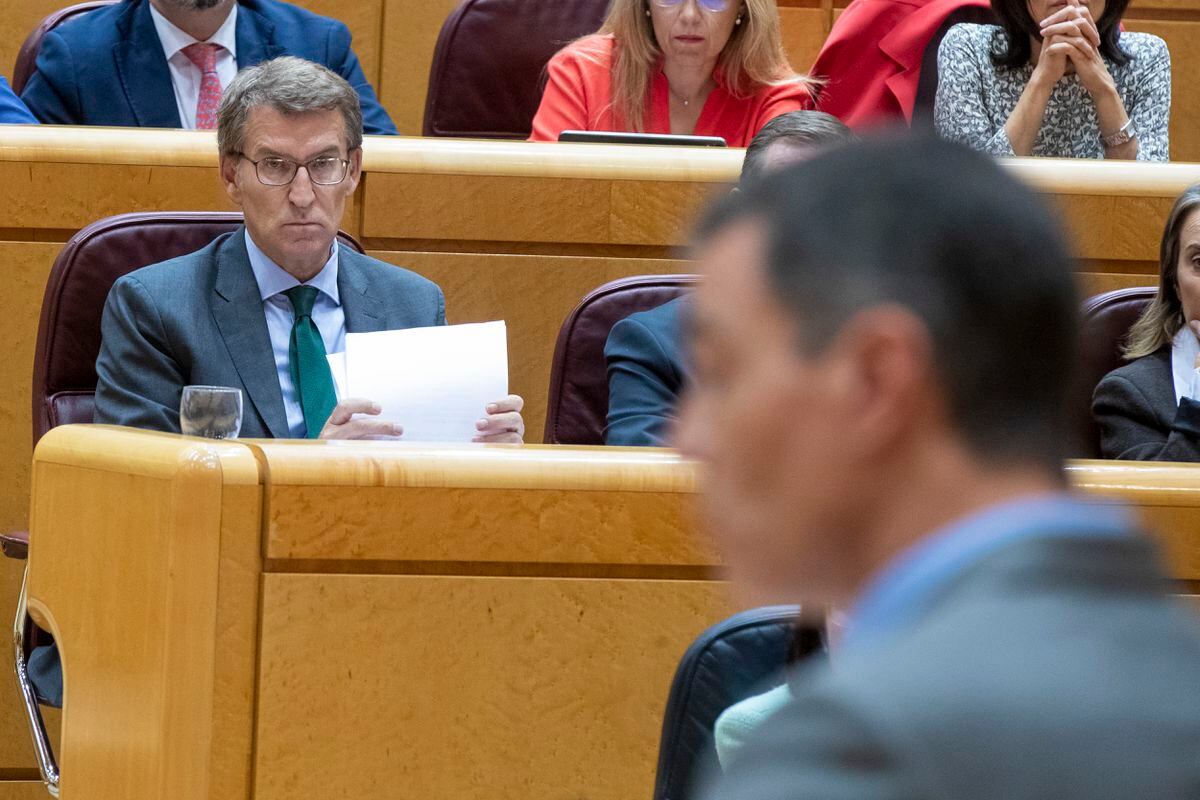The institutional crisis with which the year 2022 ended, with accusations of coup included, seems to take a greater toll on the Government than on the opposition.
In the month in which the Constitutional Court interfered for the first time in a legislative process to annul the processing of the norm that sought to overcome the blockade in the replacement of four of its magistrates;
When the reduction of the sentence for the crimes of embezzlement without personal profit was approved, the crime of sedition was repealed and the political tension soared -even more-, the popular ones rose in vote estimation and the PSOE suffered, according to the barometer January 40dB.
for EL PAÍS and Cadena SER.
The interviews (2,000) were conducted between December 27 and 31.
All the internal data from the survey can be consulted on the websites of EL PAÍS and Cadena SER.
The Socialists leave almost nine tenths of vote expectation compared to the previous barometer and the advantage of the PP is already two points over the PSOE.
In seats, the distance in favor of the popular ones goes from eight to 13 deputies when the Socialists lose three -and stay at 109- and the PP win two -up to 122-.
The sum of the parties that favored (with their vote in favor or abstention) the investiture of Pedro Sánchez in January 2020 is higher, for the moment, than that of the right-wing bloc, but the opposition seems to have won the battle of the story in the monumental anger generated by the lack of renewal of the judicial bodies that grabbed the headlines last December.
The PP of Alberto Núñez Feijóo obtains, 11 months before the general elections, scheduled for next December, 28.9% in the vote estimate, that is, 7.9 points more than in the November 2019 elections with Pablo Married of candidate.
The popular ones are made with the bulk of the loot (34.7%) of the former voters of Ciudadanos and with 9.5% of those of Vox.
They also have the most loyal voter: 80.9% of those who chose their ballot in 2019 would do it again.
Since the last generals, in which they obtained their worst electoral result (89 deputies), the PP would have risen 33 seats, according to the barometer.
Meanwhile, the party of Santiago Abascal, which suffered from the self-generated expectations in the Andalusian elections and the internal crisis caused after the departure of its candidate, Macarena Olona, is stabilizing and today it would obtain results very similar to those of the previous barometer, with 14% of the vote estimate, although far from the results of the 2019 general elections: they would go from 52 to 41 seats.
The ultra party loses more than three loyalty points this month (77.8% would repeat), although it captures more old PP voters (10.5%) than in the previous barometer.
Ciudadanos continues between political life and death.
The percentage of former voters who now prefer the PP (34.7%) is higher than that of the last faithful (30.6%).
The transfers also consolidate the brand in the right-wing block – 6.5% of its former voters would now opt for Vox – despite former alliances with the PSOE.
In the block on the left, the Socialists have a double problem of fidelity and mobilization.
Only 66.5% of his 2019 voters would repeat;
13.3% are undecided and 7.2% —two points more than a month ago— now prefer the PP ballot.
That percentage is residual inversely: only 0.3% of those who voted for the popular in the past general elections would now choose the PSOE.
It was precisely this problem, that of the low mobilization of their electorate, to which the Socialists blamed their great electoral stick last year: the loss of one of their traditional fiefdoms, Andalusia, a community where they ruled for almost 40 years, now in the hands of of the popular Juan Manuel Moreno Bonilla, who governs with an absolute majority.
The government partner, Unidas Podemos, with an estimated 11.5% of the vote, would obtain 31 seats today, one more than in the previous barometer and four less than in the 2019 elections. The formation manages to improve its loyalty —69 .3% would repeat the vote— and reduces the flight to the PSOE by three points (9.7%).
Más País remains at levels very similar to those of the previous barometer (3.6%) and would obtain four seats, one more than in the general elections.
Among those who opted to abstain in the 2019 elections, 36.7% would again ignore the ballot box, 24.2% have not yet decided what to do;
13.5% would now vote for the PP;
9.2% to the PSOE and 6.3% to Vox.
ERC, PNV and Bildu would repeat the result of 2019 with 13, 6 and 5 seats respectively.
JXC would win one, up to 9 deputies.
The BNG would go from one to two.
Only 56.2% assure that they will vote safely in the next elections.
This percentage rises to 74.3% in the case of PP voters in 2019, followed by those of Unidos Podemos (72.6%).
The voter of the party that presides over the Government, the PSOE, seems the most disenchanted and demobilized (barely 64.3% are convinced of going to vote) only behind that of Ciudadanos, which is at stake for survival and does not even have a candidate Clear.




/cloudfront-eu-central-1.images.arcpublishing.com/prisa/RUNTVUOYUJENUN2EWKUKWGRZPI.jpg)
/cloudfront-eu-central-1.images.arcpublishing.com/prisa/DXFPLFBJPRDFBOOW5OWCTCNHJU.jpg)


/cloudfront-eu-central-1.images.arcpublishing.com/prisa/QN6ATYYNOFBQVD5UUS6DW347SM.jpg)
